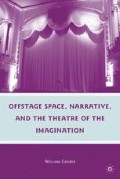Abstract
The foregoing passage from Book 3 of The Republic is often overlooked in favor of Plato’s more famous criticism of poetry in Book 10, where he condemns tragic poets not only because their imitations are three degrees removed from God and truth, but also, he says, because “poetry feeds and waters the passions instead of drying them up; she lets them rule, although they ought to be controlled.” In Plato’s view, to be sure, it is not just poetry that ought to be banished from the ideal state; all mimetic art is suspect for the reason that people who are exposed to it are deceived by the alluring qualities of the represented figures or images. Yet Plato aimed his criticism mainly against those poets who wrote for the stage, and it is here that his influence has been felt most keenly in subsequent discussions about the proper place of the arts in human societies. His insistence that spectators to theatrical performances are somehow unable to shake off habits of behavior they picked up from watching dramatic performances, whether tragic or comic, has been carried forward virtually unchanged for well over two thousand years of antitheatrical polemic. It forms the basis of every major subsequent antitheatrical discourse, being repeated (usually without acknowledgment of its ancient roots) in the seventeenth-century Puritans’ or Jansenists’ attacks on theatre or in the contemporary debate about the influence of hip-hop music.
“But if the poet should conceal himself nowhere, then his entire poetizing and narration would have been accomplished without imitation…. If Homer, after telling us that Chryses came with the ransom of his daughter and as a suppliant of the Achaeans but chiefly of the kings, had gone on speaking not as if made or being Chryses but still as Homer, you are aware that it would not be imitation but narration, pure and simple. It would have been somewhat in this wise. I will state it without metre for I am not a poet: the priest came and prayed that to them the gods should grant to take Troy and come safely home, but that they should accept the ransom and release his daughter, out of reverence for the god; and when he had thus spoken the others were of reverent mind and approved, but Agamemnon was angry and bade him depart and not come again lest the sceptre and the fillets of the god should not avail him. And ere his daughter should be released, he said, she would grow old in Argos with himself, and he ordered him to be off and not vex him if he wished to get home safe. And the old man on hearing this was frightened and departed in silence, and having gone apart from the camp he prayed at length to Apollo, invoking the appellations of the god, and reminding him of and asking requital for any of his gifts that had found favour whether in the building of temples or the sacrifice of victims. In return for these things he prayed that the Achaeans should suffer for his tears by the god’s shafts. It is in this way, my dear fellow,” I said, “that without imitation simple narration results.” “I understand,” he said.
VII. “Understand then,”said I, “that the opposite of this arises when one removes the words of the poet between and leaves the alternation of speeches.” “This too I understand,” he said, “it is what happens in tragedy.”
(The Republic, Book 3, vi–vii)
Access this chapter
Tax calculation will be finalised at checkout
Purchases are for personal use only
Preview
Unable to display preview. Download preview PDF.
Copyright information
© 2010 William Gruber
About this chapter
Cite this chapter
Gruber, W. (2010). Against Mimesis. In: Offstage Space, Narrative, and the Theatre of the Imagination. Palgrave Macmillan, New York. https://doi.org/10.1057/9780230105645_3
Download citation
DOI: https://doi.org/10.1057/9780230105645_3
Publisher Name: Palgrave Macmillan, New York
Print ISBN: 978-1-349-38449-5
Online ISBN: 978-0-230-10564-5
eBook Packages: Palgrave Theatre & Performance CollectionLiterature, Cultural and Media Studies (R0)

